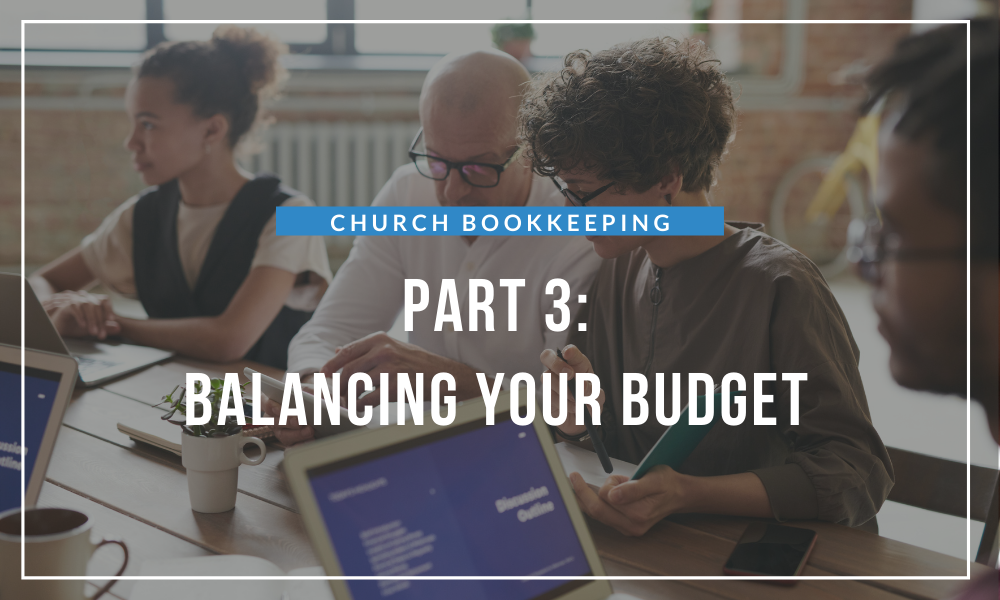Welcome to the final part of our three part series on bookkeeping and finance specific to churches. This third part of the series covers budgeting. Just like I mentioned in part two, I recommend reading the previous parts (on Helpful Tools and Program Spending) of the series since this final edition of the series builds on what was previously covered.
In part three we will be discussing budgeting and the various aspects of the process to consider while walking your clients through building a budget.
Budgeting Philosophy
The biggest challenge to budgeting is making sure that the appropriate people are involved in the process. Usually the primary champion of the budgeting process is whoever is sitting in the board treasurer or church operations role. Unfortunately, this most often ends up as the only person that cares about having a budget.
It may seem simplistic, but it’s important to start with the basics: “What is a budget?” Throughout my years of helping with budgets, and even working on my own household budget, I have learned that a budget is a plan for how to spend money. With a church, that money belongs to the churchgoers who donated those funds. In a church, a budget is a plan for how to spend other people’s money and that plan should support the ministry goals and objectives of the church.
Who Should Make the Budget?
Since these ministry goals and objectives are often discussed and set by church leadership, a budget should support those goals. Because of this it is vitally important that other members of leadership contribute to, or assist with budgeting. In most cases, pastors and lay leaders are not financially minded so their natural inclination is to avoid the budgeting process altogether. In their minds that is the reason they hired or appointed an operations or finance director.
As outsourced bookkeepers and consultants, the goal here is to advise our church clients that the budget committee should consist of ministry leaders, operations staff, and ministers. During the process the question of “Does this budget support the ministry goals and objectives of our church?” should be at the forefront of everyone’s minds, and the committee consists of all the right people that can answer that question.
The Mechanics of a Balanced Budget
Now that all the right people are at the table, it’s okay for the operations and financially minded leaders to lead the process. The best place to start is with income.
Income for a church can be a challenge due to the following:
- How many church attenders are giving?
- Will those church attenders continue to give at the rate they are giving?
- If the church is growing, how much will the revenue grow?
- If the church is getting smaller, are the people leaving regular givers?
- Of the people leaving, how much are they giving?
- Is there a plan to encourage increased giving in the upcoming period?
In part two of this series some of the donor management and church management tools that I listed can help to answer these questions. Other questions are better answered by pastors and ministry leaders, which is why it’s important that they are involved in the process.
Once all these questions are answered it’s important that the revenue budget is set based on practical expectations and not on the amount that is desired. The revenue can be divided evenly across all twelve months of the year, or allocated differently to each month based on previous year giving trends. If using the latter method, make sure that the monthly cash flow can handle particular months where expenses may exceed revenue. This situation may arise since most expenses are the same month-to-month, but monthly revenue can fluctuate. Once revenue is determined, expenses naturally follow.
The first pass through expenses can be accomplished without looking at revenue, and based only on the needs of the church and ministries. It’s important that expenses are then compared to the overall projected revenue. If total expenses exceed total revenue for the year, that means the church likely can’t accomplish everything that it wants to that year. This is again why it is important to have a budget committee made up of ministry leaders and pastors because at this point, hard decisions will have to be made about where to reduce expenses. These decisions should be guided by the ministry goals of the church, and if expenses are cut in certain areas, it’s a collective decision instead of a financial director simply moving numbers around on a spreadsheet.
At the end of the process the difference between total expenses and total income ideally should be zero. If expenses exceed revenue, that means there will be an expected cash burn (disregarding any balance sheet considerations). If revenue exceeds expenses, there is the potential that the extra money can be put towards a reserve for future savings.
Bookkeeping to Serve the Church
As stated earlier, budgeting is important and because it is important, needs to involve many stakeholders. Since churches are made up of many people, many people should be involved. In our role as trusted advisors we can encourage the churches we are serving in this direction.
Since this wraps up the three part series on outsourced church bookkeeping, our hope is that we have helped to provide clarity on some of the potential pitfalls of serving churches. The intention is that this will help to increase the value that we are providing, and ensure the success of the churches and non-profit ministries we are serving.
If you are an outsourced bookkeeper looking for further ideas, or a church that is in need of outsourced bookkeeping, we are glad to serve, and we can be reached at hello@systemsix.com.




